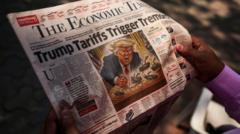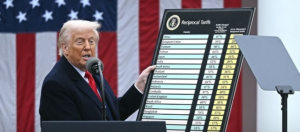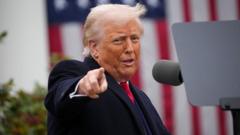Examining the parallels between Brexit and President Trump's recent tariff revisions reveals essential insights into economic strategy and the resulting impacts.
Lessons from Brexit: Insights on Trump's Tariffs and Economic Isolationism

Lessons from Brexit: Insights on Trump's Tariffs and Economic Isolationism
As Britain's Brexit experience mirrors the effects of Trump's tariffs, lessons on economic isolationism arise.
Britain has watched President Trump’s tariffs with a mix of shock, fascination, and uncomfortable recognition. The country embarked on a similar journey of economic isolationism when it voted to leave the European Union in 2016. Nearly nine years after the Brexit referendum, the economic implications are still being felt.
The lessons from Brexit are becoming increasingly pertinent as Mr. Trump employs a comparable strategy to build barriers around the United States. Critics once labeled Brexit as the most significant act of self-inflicted economic harm by a Western nation since World War II. Now, it seems to have a contender across the Atlantic.
Trump's abrupt decision last week to roll back some tariffs after facing a backlash from bond markets echoed Britain’s experiences where former Prime Minister Liz Truss had to abandon radical tax cuts that alarmed investors. Her short-lived administration culminated from extreme policies that arose after Britain's decision to leave the single European market.
Mark Malloch Brown, a former British diplomat who served as deputy secretary-general of the United Nations, remarked, “In a way, some of the worst legacies of Brexit are still ahead.” The crux of the issue remains Britain's fractured relationship with its largest trading partner. Malloch Brown elaborated, “If the U.K. ends up seeking reconciliation with Europe because it can no longer cooperate with the U.S., that’s only a partial victory.”
As the U.K. contemplates its trading future, it faces pivotal decisions regarding its relationships with Europe and America while navigating the unprecedented economic landscape shaped by both Brexit and U.S. tariff strategies.
The lessons from Brexit are becoming increasingly pertinent as Mr. Trump employs a comparable strategy to build barriers around the United States. Critics once labeled Brexit as the most significant act of self-inflicted economic harm by a Western nation since World War II. Now, it seems to have a contender across the Atlantic.
Trump's abrupt decision last week to roll back some tariffs after facing a backlash from bond markets echoed Britain’s experiences where former Prime Minister Liz Truss had to abandon radical tax cuts that alarmed investors. Her short-lived administration culminated from extreme policies that arose after Britain's decision to leave the single European market.
Mark Malloch Brown, a former British diplomat who served as deputy secretary-general of the United Nations, remarked, “In a way, some of the worst legacies of Brexit are still ahead.” The crux of the issue remains Britain's fractured relationship with its largest trading partner. Malloch Brown elaborated, “If the U.K. ends up seeking reconciliation with Europe because it can no longer cooperate with the U.S., that’s only a partial victory.”
As the U.K. contemplates its trading future, it faces pivotal decisions regarding its relationships with Europe and America while navigating the unprecedented economic landscape shaped by both Brexit and U.S. tariff strategies.






















